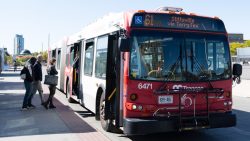Ongoing issues with OC Transpo bus reliability lead to a testy exchange at Ottawa’s Transit Commission meeting March 18, as River Ward Coun. and Deputy Mayor Riley Brockington pressed for answers on why the city does not yet have data that could help address the issues.
“I’m going to ask you this again because I asked you this question last month, to come back to the commission and give us an outline in addition to what you’ve provided today on how we’re targeting on-time performance. You’re aware of all the factors that contribute and threaten on-time performance but as you know this is eroding the public trust and confidence in bus service,” Brockington said.
“The on-time performance data is more or less static this month compared to last. You’ve got two metrics: You measure bus frequency less than every 16 minutes; and bus frequency higher than 16 minutes. And it’s the bus frequency higher than 16 minutes that seems to be the most challenging for you right now at 66 per cent,” he said.
That number represents the proportion of busses on those routes that have on-time departures from major stops. In the past, some routes have been much worse performing than others.
In response, OC Transpo general manager Renée Amilcar said that the agency is still struggling with the number of drivers and busses.
“We don’t have enough buses or drivers. When we have to deal with traffic and we don’t have any buffer time to address those issues. It’s hard to commit to the on-time performance,” she said.
But Amilcar also said that ‘regularity’ is a concept that is not captured by current on-time metrics.
“If you have a bus every five minutes. The first one, let’s say it’s late and you arrive four minutes
late, you don’t want another bus one minute later. So we will deliberately work with the bus drivers, with the control room, to delay the second one, the third one, the fourth one, etc.,” she said.
“All of them will be late but we don’t care because it’s it’s a regularity which is important here.”
Amilcar added that OC Transpo is working on a reliable way to measure bus performance, but insisted that the actual experience of riders is not captured by existing metrics.
“Our customers have a better service than what you see on the chart,” she said.
But Brockington reiterated the need for some solid metrics so the transit agency can address the ongoing reliability issues.
“Your job is to come back to us and say ‘I need more money because I need to hire more operators. I know what the factors are that are contributing to on-time performance challenges,’” he said.
“But if we don’t establish performance targets if we don’t establish benchmarks to get us up to from 66 per cent to 70 to 75 and create a plan, we’re just going to talk about this every month.”
The next Transit Commission meeting is scheduled for April 11, 2024.




